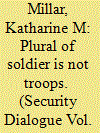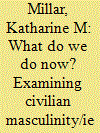|
|
|
Sort Order |
|
|
|
Items / Page
|
|
|
|
|
|
|
| Srl | Item |
| 1 |
ID:
142542


|
|
|
|
|
| Summary/Abstract |
Since the invasions of Afghanistan and Iraq, over 150 female American military personnel have been killed, over 70 following hostile fire. Given Western society’s long-standing practice of reserving the conduct of collective violence to men, these very public deaths are difficult to encompass within the normative and ideological structures of the contemporary American political system. This study examines the ways in which the public duty to commemorate the heroism of soldiers – and the private desire to accurately remember daughters and wives – poses a significant challenge to coherent discursive representation. In doing so, the study employs hermeneutical interpretation to analyse public representations of female soldiers and their relation to death in US popular culture. These representations are examined via Judith Butler’s concept of grievability – the possibility of receiving recognition as a worthy life within the existing social imaginary. It is argued that female soldiers are grievable as both ‘good soldiers’ and ‘good women’, but not as ‘good female soldiers’. The unified subject position of ‘good female soldier’ is liminal, and thus rendered socially and politically unintelligible. The article concludes with an analysis of the implications of this liminality for collective mourning and the possibility of closure after trauma.
|
|
|
|
|
|
|
|
|
|
|
|
|
|
|
|
| 2 |
ID:
165897


|
|
|
|
|
| Summary/Abstract |
This article identifies ‘the troops’ as a new, radically under-examined figure in the Western canon of war. Utilising discourse analysis of an original corpus of US ‘support the troops’ material from 2001 to 2010, the article argues that ‘the troops’ cannot be read as a simple aggregation of the figurative soldier or literal military personnel. Instead, ‘groupness of the troops’ shifts the politics of the legitimation of violence – and the possibility of meaningful dissent – in two distinct ways. Firstly, ‘the troops’ are figured, counterintuitively, as passive, dependent and at risk of suffering harm. This enables constructions of militaristic, heroic violence to coexist with empirical experiences of vulnerability without ideological contradiction. Secondly, though many accounts of militarism rely upon citizens’ aspirational identification with the ostensibly-universal soldier, the ‘groupness’ of the troops enables them to incorporate, rather than elide, substantive differences (e.g. race, gender or sexual orientation) through an all-encompassing relationship of ‘support’. Consequently, ‘the troops’ may be a more effective avatar of militarism than ‘the soldier’ – and far more important to the legitimation, depoliticization and even perpetuation of conflict than previously realized. What would the politics of military involvement in Afghanistan and Iraq have looked like absent the ‘escape valve’ of the figurative troops?
|
|
|
|
|
|
|
|
|
|
|
|
|
|
|
|
| 3 |
ID:
164977


|
|
|
|
|
| Summary/Abstract |
In contemporary Western, liberal democratic societies, the soldier is frequently regarded as ‘the best of us’, taking on the unlimited liability for the protection and betterment of the whole. In the context of volunteer militaries and distant conflicts, the construction of men (and the universalised masculine citizen) as ‘always-already’ soldiers (or potential soldiers) poses a substantial obstacle to the identification or performance of ‘good’ civilian masculinity – particularly during wartime. The theorisation and articulation of a positive, substantive civilian masculinity, or masculinities, rather than one defined simply by an absence of military service and implication in the collective use of violence, is a central challenge of contemporary politics. As a means of illuminating the complex dynamics of this challenge, this article examines charitable practices of civilian support for the military, and corresponding constructions of masculinity, in the UK during the ‘war on terror’. In doing so, the article demonstrates the ways in which gendered ‘civilian anxiety’, through its connection to citizenship, comes to condition the political possibilities and subjectivities of all those who seek belonging in the liberal political community. The article concludes by arguing for the essentiality of a research programme oriented around ‘civilianness’, and civilian masculinity/ies.
|
|
|
|
|
|
|
|
|
|
|
|
|
|
|
|
| 4 |
ID:
182656


|
|
|
|
|
| Summary/Abstract |
What makes violence martial? Contemporary militarism scholarship, owing to an analytical overdetermination of the role of military institutions, frequently conflates martiality with violence writ large. Drawing upon the illustrative case of Adopt A Sniper, a US military support charity founded by police officers operating during the global war on terror and intended to help supporters ‘directly contribute to the killing of the enemy’, this article interrogates the intuitive ‘line’ between martial and other, particularly colonial, forms of violence. To do so, I develop the concept of ‘normative imaginaries of violence’ – articulations of intersubjective beliefs; political community; spatial geographies; gendered, sexualized, racialized and classed power relations; and logics of legitimation. Through this lens, and informed by the work of Frantz Fanon, the article demonstrates that though coloniality and martiality are deeply intertwined, they are neither reducible to nor epiphenomenal of each other. Through a juxtaposition of the titular sniper with two additional figures invoked by Adopt A Sniper – the militiaman and the vigilante – I outline a novel, genealogical method that enables us to trace the entangled histories of contemporary violences and identify the implicit politics of ordering at work in existing, often fragmented, analyses of political violence.
|
|
|
|
|
|
|
|
|
|
|
|
|
|
|
|
|
|
|
|
|